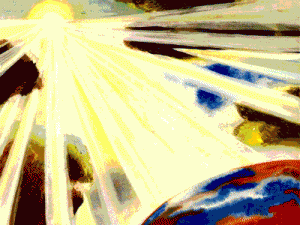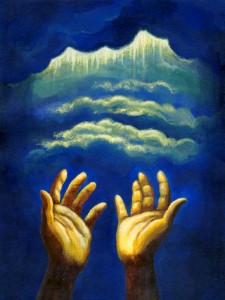When Yeshua overturnend the money changers’ tables in the Jerusalem temple and cursed the fruitless fig tree after his triumphal entry, he was taking a political stand. He was also predicting his destruction of the evil New World Order Babylon the Great antichrist system at his second coming as this video explains.
Tag Archives: Yeshua
Being Cast Into Outer Darkness Vs. the Fiery Furnace
Matthew 22:13, Outer [or exterior] darkness. This is likely not a reference to destruction in the lake of fire, which is the fate of the wicked, but rather the place where those who will be least in the kingdom (Matt 5:19) will reside. They will not be living in close proximity to Yeshua as his bride in the New Jerusalem, which is a place where there is no darkness or night, for Yeshua who is the Sun of Righteousness (Mal 4:2) and whose face shines like the suns (Rev 1:16) will be the light of the New Jerusalem (Rev 21:23; 22:5).
Rather, the place of reward for those who weren’t properly attired in robes of righteousness (Matt 22:11) will be to live further away from the New Jerusalem somewhere in the New Earth. Light is a biblical metaphor for a knowledge of the truth or being able to see spiritually, while darkness is a metaphor for ignorance or spiritual blindness.
It is possible that these who will be least in the kingdom, though possessing eternal life, will be living in a state of not possessing as much divine revelation or spiritual light because their reward. This is because they failed to properly prepare their robes of righteousness to be the bride of Yeshua as the lesson of the previous parable teaches us. The reward of these people who will be least in the kingdom will be to abide in a place on the new earth that is further away from the New Jerusalem and that has less spiritual light shining on it.
Outer darkness being a lower position in the kingdom of Elohim as opposed to being cast into the lake of fire seems to the idea in the other scripture passages where Yeshua uses this phrase ( Matt 8:12; 25:30). In the verbal imagery of Yeshua, being cast into outer darkness seems to be in direct contrast to being cast into a fiery furnace, which is a reference to the fate of the wicked. This fate is final and is eternal damnation in the lake of fire (Matt 13:42, 50 cp. 3:12; 25:41; Mark 9:43–49; Rev 19:20; 20:10, 14, 15; 21:8).
Woe be to a false religious and economic system that are in bed together!
Matthew 21:12, Temple of Elohim…money changers. With the same violence that Yeshua threw out those who loved money from YHVH’s temple, we must cleanse the temple of our spirits by expelling from our souls the love of money, which is the root of all evil (1 Tim 6:10).

At his second coming, Yeshua will destroy the fruitless, end times whore system of banking and religion.
In this event, Yeshua is coming against the rapacious banking system of the nation of Israel, which was centered around the temple, which was the storehouse of the nation’s wealth. This evil banking system continues to this day and is run by a cabal of global elitists who control the governments and economies of this world for their own benefit. Often the religious and banking systems are united at some level, since both are motivated by the love of money and power. At the highest levels, neither care for the welfare or well-being of the common man — especially the poor and helpless who have little power, wealth, voice and influence. At Yeshua’s second coming, he will suddenly come to his Continue reading
“Hosannah in the highest” — One Phrase With Many Prophetic Meanings
Matthew 21:9, Hosannah in the highest. The simple Hebrew phrase hoshana rabbah has more depth and spiritual significance than first meets the eye. Let’s explore it.
First of all, it was this phrase—hosanna in the highest—(Heb. hoshana rabbah) that the crowds of Jews exclaimed as Yeshua entered Jerusalem riding a colt in Matthew 21:9 (also Mark 11:9; Luke 19:38). This event has become known as Yeshua’s “Triumphal Entry.”
The phrase hoshana rabbah, in part, derives from Psalm 118:25, a psalm which is called the Great Hallel (Heb. meaning “praise”), and was the climax of a series of psalms that the priests would proclaim or sing from the temple in Jerusalem on various feast days including the Feast of Tabernacles.
Psalm 118 is a prophetic psalm, which speaks of the coming Messiah who was the hope of the Israelite people. The words of this psalm prophetically points to Yeshua the Messiah in every way. That’s why the crowds proclaimed “hoshana in the highest, ” at Yeshua’s entry into Jerusalem, for upon him, they had pinned their highest hopes of a Messianic figure who would deliverer them from their oppressors (in this case, the Romans).
The actual Hebrew words in Psalm 118:25 are ana YHVH hoshiah na, which can be translated as “I beg you YHVH save now,” (Green’s Interlinear), “Save now, I pray, O YHVH” (KJV), or “O [YHVH], please save us!” (The ArtScroll Stone Edition Tanach).
The phrase “Hosanna in the highest” was an added exclamation of the people, and is not Continue reading
Prophetic Types and Shadows: A Quick Study on Isaac and Rebekah
There are many prophetic spiritual types and shadows to be found in the Torah that point forward prophetically to Yeshua the Messiah. A series of events in Isaac’s life beginning in Genesis 22 and culminating in chapter 24 provide us with some amazing antetypical glimpses into events that would surround the life of Yeshua the Messiah Continue reading
Five Old Testament Scriptures That Specifically Prophesy That Yeshua Is the Messiah
Matthew 16:16, The Son of the living Elohim. One day, Yeshua asked his disciples who they thought he was. Peter answered, “You are the Messiah, the Son of the living God. (Matt 16:15–16) How did Peter know this? Were there any hints in the Tanakh (Old Testament) that the Messiah would be the Son of Elohim, since these were the only Scriptures Peter had?
Their are numerous prophecies in the Tanakh about the Messiah. Here is a list of scriptures that prophesy specifically that he would be the Son of Elohim with some brief comments following.
Therefore Adonai himself shall give you a sign: Behold, a virgin shall conceive, and bear a son, and shall call his name Immanuel [Heb. God with us]. (Isaiah 7:14)
Many Bible prophecies have double meanings or fulfillments. Such is the case with this prophecy. It was partially fulfilled in Isaiah’s life (Isa 8:3), but not completely. Isaiah’s son was neither deity nor was he known as “God with us.” Yeshua the Messiah was (Matt 1:23).
He shall cry unto me, “You are my father, my El [God], and the rock of my salvation.” Also I will make him my firstborn, higher than the kings of the earth. (Psalm 89:26, 27)
Again, this prophecy has a double fulfillment. It was partially fulfilled by David and his sons, but not completely. Only Yeshua, who also was from David’s lineage, fulfilled the superlative aspects of this prophecy. Not only Continue reading



